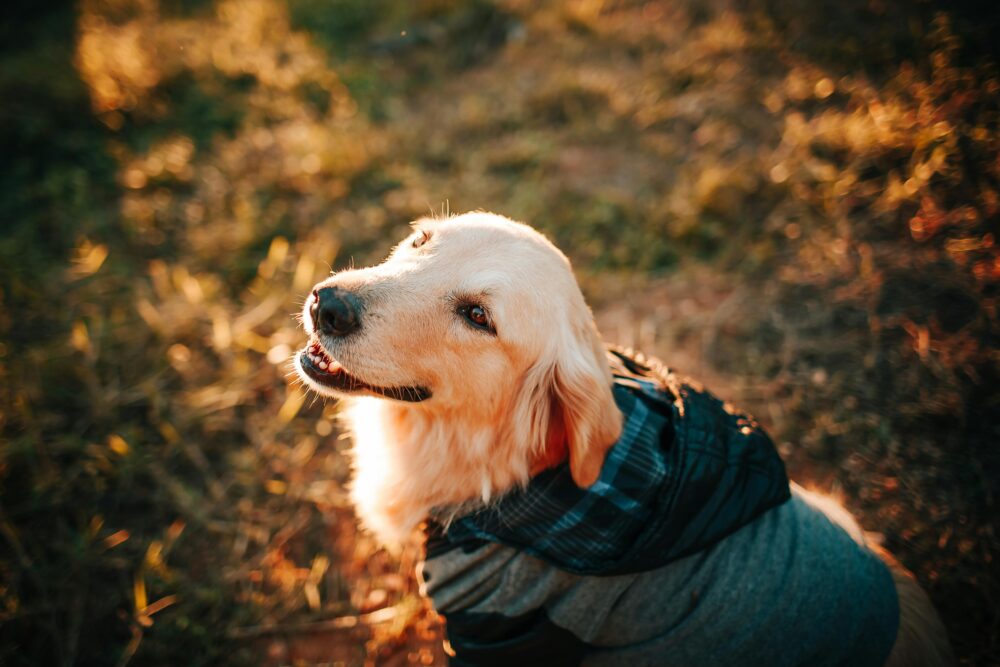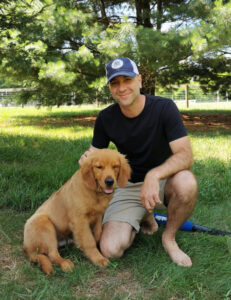Do Golden Retrievers Drool? Normal & Excessive Drooling

Drooling in dogs is a common topic among pet owners, often sparking curiosity and concern. While drooling can be perfectly normal, it’s essential to understand what constitutes typical drooling behavior and when it might indicate a health issue.
Golden Retrievers, known for their friendly and gentle nature, often leave potential owners wondering about their drooling habits.
Are Golden Retrievers prolific droolers, or do they keep their slobber to a minimum? Let’s explore this further.
Why Do Dogs Drool?
Drooling is a natural and normal behavior in dogs. It typically occurs as a response to specific stimuli, such as the sight or smell of food, excitement, or even anxiety. The salivary glands produce saliva, which helps in the digestion process and keeps the mouth moist. In some breeds, drooling is more pronounced due to their facial structure and the way their lips hang. For instance, breeds with loose, hanging jowls, like Saint Bernards and Mastiffs, tend to drool more than others.
However, the amount of drooling can vary significantly between breeds and even among individual dogs within the same breed. Understanding the factors that influence drooling in dogs can help owners recognize what is normal and what might be a cause for concern.
Food Anticipation
Just like humans, dogs naturally drool when they anticipate food. The sight, smell, or even the sound of food being prepared can trigger their salivary glands. This response is particularly common during mealtime or when treats are involved. It’s the body’s way of preparing for digestion.
Excitement
Some dogs drool when they are excited. This excitement can be due to various reasons, such as playtime, greeting their owners, or anticipating a walk. The increased activity and stimulation can cause their salivary glands to produce more saliva, leading to drooling.
Certain Breeds
There are specific dog breeds known to drool more than others due to their facial structure. Breeds like Mastiffs and Bulldogs, with their loose, hanging jowls, tend to have a higher propensity for drooling. This structural trait allows saliva to pool in their mouths, resulting in more frequent drooling.
Resting or Sleeping
Dogs may drool slightly when they are relaxed or sleeping deeply. During these times, their mouths might remain slightly open, allowing saliva to escape. This is usually not a cause for concern and is considered a normal part of their behavior.
Heat and Exercise
During hot weather or after vigorous exercise, dogs may drool more as a way to cool down. Panting and drooling help them regulate their body temperature. This increased salivation is a natural cooling mechanism and is especially noticeable in dogs with thick coats or those not accustomed to high temperatures.
Golden Retrievers & Drooling
Golden Retrievers typically exhibit a moderate level of drooling compared to breeds with heavier facial structures and loose jowls. While breeds like Mastiffs and Bulldogs are known for their pronounced drooling due to their anatomical features, Golden Retrievers generally do not drool excessively.
However, they may drool slightly in certain situations, such as when anticipating food or when excited. This drooling is usually minimal and manageable, making them an attractive option for those who prefer a dog with lower drooling tendencies.
How To Control Drooling in Golden Retrievers
Regular Grooming Practices
Keeping the area around your Golden Retriever’s mouth clean and dry is essential in managing drooling. Regularly wiping away excess saliva with a soft cloth or dog-safe wipes can help prevent skin irritation and maintain hygiene. Ensuring that your dog’s facial hair is trimmed can also reduce the accumulation of saliva and food particles around their mouth.
Chew Toys or Dental Treats
Providing appropriate chew toys can stimulate saliva production in a controlled manner and help manage drooling. Chew toys and dental treats designed to promote oral health can reduce plaque buildup and keep your dog’s mouth healthy. These items not only entertain your dog but also support their dental hygiene, reducing the likelihood of excessive drooling caused by oral health issues.
Balanced Diet
A balanced diet plays a crucial role in maintaining overall health and minimizing excessive drooling. Avoiding foods that may stimulate excessive saliva production can help keep drooling under control. Feeding your Golden Retriever a high-quality, well-balanced diet ensures they receive the necessary nutrients without triggering excessive salivation.
Dental Hygiene
Regular dental care is vital for your Golden Retriever’s oral health and can significantly impact their drooling behavior. Brushing your dog’s teeth with dog-specific toothpaste and a toothbrush helps prevent dental issues that could lead to excessive drooling. Additionally, regular dental check-ups with your veterinarian are important to monitor and maintain your dog’s oral health.
Behavioral Training
Behavioral training techniques can also help manage excessive drooling. Using redirection and positive reinforcement, you can discourage behaviors that lead to increased drooling. Training your dog to stay calm and composed, especially in situations that typically trigger excitement or anxiety, can reduce drooling episodes.
When Should You Be Concerned?
While drooling is a normal part of a dog’s behavior, excessive drooling can sometimes be an indicator of underlying health issues. It’s important to recognize that excessive drooling varies from dog to dog and situation to situation. Understanding the possible causes of excessive drooling in Golden Retrievers can help you identify when to seek veterinary care.
- Oral and Dental Problems: Dental issues like gingivitis, periodontal disease, or infections can cause increased drooling. Pain from dental abscesses or fractures can also lead to drooling. Regular check-ups and good oral hygiene can prevent these problems.
Gastrointestinal Issues: Nausea and digestive disorders such as gastritis, IBD, or toxic ingestion can cause drooling. If your Golden Retriever shows nausea or digestive distress with drooling, consult a vet.
Respiratory Problems: Upper respiratory infections like kennel cough, sinusitis, or throat infections can lead to excessive drooling. Monitor your dog’s respiratory health and seek treatment for infections.
Neurological Conditions: Seizures, epilepsy, nerve damage, or lesions can cause excessive drooling. If your Golden Retriever has unexplained drooling with other neurological symptoms, see a vet.
Motion Sickness: Nausea from car rides or transportation can cause drooling, panting, and restlessness. Use motion sickness treatments or acclimate your dog to car rides.
Heatstroke: Overheating can cause excessive drooling and panting. Heatstroke requires immediate attention. Keep your Golden Retriever cool and hydrated, especially in hot weather or during exercise.
Medication Side Effects: Some medications cause increased drooling as a side effect. If your dog is on medication and drooling more, consult your vet to see if an adjustment is needed.
Wrapping Up
To sum up, while drooling is normal for dogs, it’s important to distinguish between typical and excessive drooling. Golden Retrievers generally drool less than some other breeds. Monitoring your dog’s drooling habits can help detect health issues.
Understanding causes like dental problems, gastrointestinal issues, respiratory problems, neurological conditions, motion sickness, heatstroke, and medication side effects can aid in providing the best care. Regular vet visits and maintaining good health are essential for managing and preventing excessive drooling.
Frequently Asked Questions About Do Golden Retrievers Drool
When should I worry about my dog drooling?
You should worry about your dog drooling if it is excessive, sudden, or accompanied by other symptoms like lethargy, loss of appetite, or signs of pain. Consult your veterinarian if you notice any unusual changes in your dog’s drooling patterns.
What dog doesn't drool a lot?
Breeds that typically don’t drool much include the Basenji, Dachshund, and Whippet. These breeds have tighter lips and mouths, which help minimize drooling.
How to stop a golden retriever from drooling?
To manage your Golden Retriever’s drooling, keep the area around their mouth clean and dry, provide appropriate chew toys, and ensure they have a balanced diet and good dental hygiene. If drooling persists or seems excessive, consult your veterinarian.
Do golden retrievers drool while sleeping?
Yes, Golden Retrievers can drool while sleeping, especially if they are in a deep, relaxed sleep with their mouths slightly open. This is generally normal and not a cause for concern unless it becomes excessive.

Galen Kauffman has been connecting quality Golden Retriever breeders with loving families since 2012. He is the founder of My Golden Retriever Puppies. Galen and his wife have four children and enjoy spending time together, traveling (including 4 years living overseas), exploring the outdoors, and building lasting connections within the Golden Retriever community.
